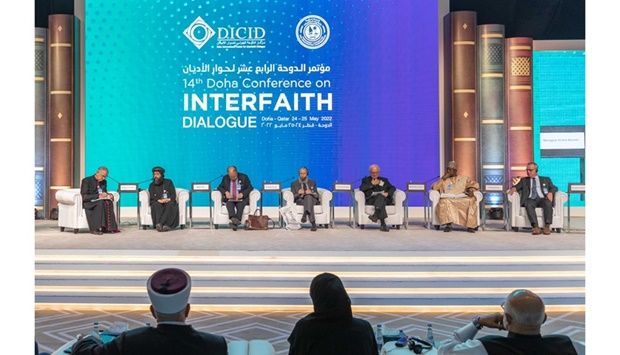Doha Conference on Interfaith Dialogue discussed during a plenary session on its second day the desired role in confronting hate speech, and the visions of followers of religions to confront this phenomenon that leads to violence and crime.
The participants unanimously agreed that all religions agree in their principles and values on the love and peace speech, affirm the one origin of human beings, and rejects hatred, malice and intolerance, noting the importance of proceeding from these religious principles and values to promote peace among human beings, and transforming them into programs and strategies for religious, educational, and cultural institutions to confront hate speech.
Papal vicar of the churches of ancient Egypt Mina Bushra of Egypt said that the religious commandments are clear in calling for respect for the other. Religious leaders and institutions and the media should start from these commandments to confront hate speech.
He pointed out to practical means that contribute to achieving such an approach, such as joint workshops to promote peaceful coexistence, the preparation of wise and loving leaders, permanent dialogue, joint practical publications, and joint social projects among followers of religions in the same society.
In turn, Head of the Department of Philosophy at Ibn Haldun University (IHU) in Turkey Dr. Burhan Kroglu said that focusing on the faith, value and moral commonalities between followers of religions is an entry point to confront hate speech. He added that there are common points that we must focus on to reduce hateful and intolerant discourse, which leads to violence and crime.
For his part, Rabbi Reuven Firestone of the Hebrew Union College in Los Angeles (USA) warned that hate speech develops into biased attitudes that in turn lead to discrimination in its various political, economic and religious forms, which ultimately leads to violence to confront this reality, which may develop into genocide, adding that hate speech is very dangerous, with devastating consequences for humanity.
In addition, Bishop William Shomali of Jerusalem focused on practical examples that contribute to confronting hate speech, which he attributed to ignorance of religion. He said that we may be ignorant of our religion or we are ignorant of the religion of the other, and this leads to a hostile and abnormal discourse, affirming that education is sufficient to address this ignorance.
He also drew attention to the issue of justice and fairness, which is often absent and leads to hate speech due to a sense of injustice and oppression, pointing to the importance of achieving justice for societies that suffer from injustice, oppression and betrayal.
The second day of the conference witnessed parallel dialogue sessions on the patterns and forms of hate speech, the current practices of this speech, and the role of religious leaders and media and educational institutions in combating this discourse, in addition to discussing international conventions and laws criminalizing this and a review of realistic models to address this widespread phenomenon on more than one level.
Later today, the conference is scheduled to hold a closing session to review its results and recommendations to confront hate speech and promote the speech of coexistence and peace among societies.

